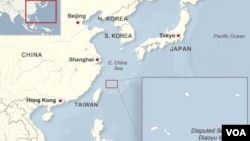China is lashing out at a major U.S. newspaper for publishing an editorial urging Washington to offer stronger support to Japan in its heated territorial dispute with Beijing.
A Friday editorial in The Wall Street Journal said China is likelier to "back down" if the Obama administration is more explicit that the islands at the heart of the dispute belong to Japan.
The piece, which did not contain a byline, also said "Japan needs U.S. support against Chinese bullying" over the islands, known in Japan as Senkaku and in China as Diaoyu.
In response, China's state-run Xinhua news agency on Tuesday ran its own editorial, suggesting the Journal was acting as a "mouthpiece" for the Japanese government on the islands issue.
The Xinhua editorial accused the Journal of taking an "extreme" position, despite what it said was the paper's "reputed balanced news reporting."
China's foreign ministry on Monday also took aim at the U.S. paper, urging it to take an "objective and partial stance, and play a more constructive role in easing tensions."
White House officials say they have refused to take a position on the islands' sovereignty, but acknowledge that as they are under Japanese administration they do fall under a mutual U.S. defense treaty with Japan.
Japan annexed the strategic yet uninhabited islets in the late 19th century. The islands were then administered by the U.S. from the end of World War Two until they were transferred back to Japan in 1972.
China does not recognize the U.S.-Japan transfer. It claimed sovereignty over the archipelago in 1971, saying ancient maps show it has been Chinese territory for centuries.
Ownership of the islands has taken on added fervor with the discovery of oil and other natural resources in the area, which is one of the world's busiest shipping lanes.
The maritime dispute has severely strained Tokyo-Beijing ties in recent months, especially after Japan's government bought some of the islands last year from their private Japanese owner to pre-empt Tokyo's right wing governor, Shintaro Ishihara, who had announced that he would buy them.
Since then, China has sent regular air and sea patrols near the East China Sea islands, in what many see as an attempt to challenge Japan's administration of the area.
A Friday editorial in The Wall Street Journal said China is likelier to "back down" if the Obama administration is more explicit that the islands at the heart of the dispute belong to Japan.
The piece, which did not contain a byline, also said "Japan needs U.S. support against Chinese bullying" over the islands, known in Japan as Senkaku and in China as Diaoyu.
In response, China's state-run Xinhua news agency on Tuesday ran its own editorial, suggesting the Journal was acting as a "mouthpiece" for the Japanese government on the islands issue.
The Xinhua editorial accused the Journal of taking an "extreme" position, despite what it said was the paper's "reputed balanced news reporting."
China's foreign ministry on Monday also took aim at the U.S. paper, urging it to take an "objective and partial stance, and play a more constructive role in easing tensions."
White House officials say they have refused to take a position on the islands' sovereignty, but acknowledge that as they are under Japanese administration they do fall under a mutual U.S. defense treaty with Japan.
Japan annexed the strategic yet uninhabited islets in the late 19th century. The islands were then administered by the U.S. from the end of World War Two until they were transferred back to Japan in 1972.
China does not recognize the U.S.-Japan transfer. It claimed sovereignty over the archipelago in 1971, saying ancient maps show it has been Chinese territory for centuries.
Ownership of the islands has taken on added fervor with the discovery of oil and other natural resources in the area, which is one of the world's busiest shipping lanes.
The maritime dispute has severely strained Tokyo-Beijing ties in recent months, especially after Japan's government bought some of the islands last year from their private Japanese owner to pre-empt Tokyo's right wing governor, Shintaro Ishihara, who had announced that he would buy them.
Since then, China has sent regular air and sea patrols near the East China Sea islands, in what many see as an attempt to challenge Japan's administration of the area.
